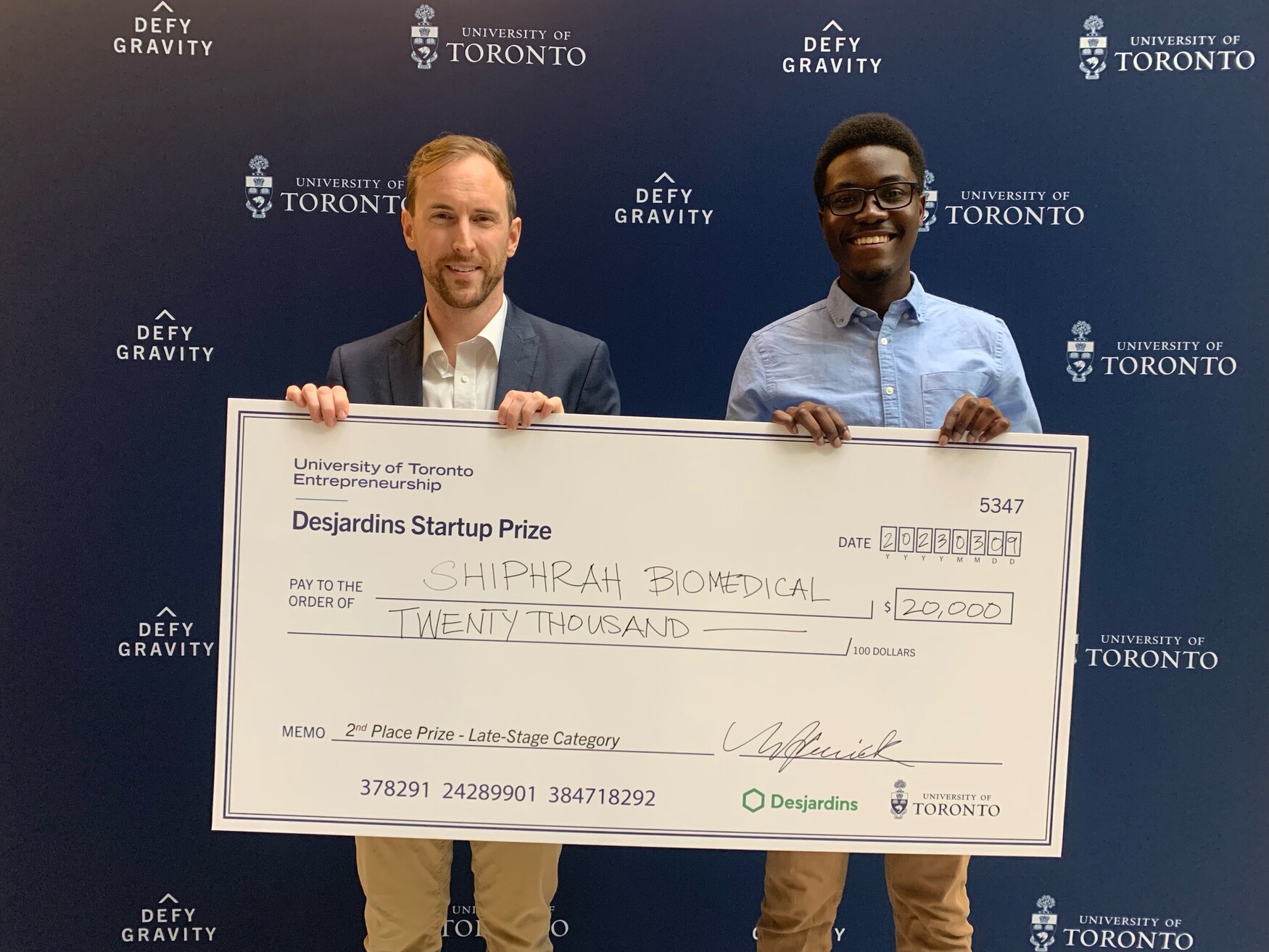Mobile Menu
- Education
- Faculty
- Research
- News & Events
- Divisions
- Equity, Diversity & Inclusion
- About Us

A sleep researcher for the last decade, Dr. Allan Kember likely suffered through a few restless nights himself recently.
First, Kember — a PGY4 resident in our Department who is currently pursuing a master’s degree as part of the Ob-Gyn Surgeon Scientist Training Program and Temerty Medicine's Clinician Investigator Program — had to tackle writing his Royal College of Physicians and Surgeons of Canada examinations on March 7 and 8.
At the same time, Kember had to simultaneously prepare for the daunting task of presenting at the University of Toronto’s Desjardins Startup Prize contest — an annual business pitch competition during which entrepreneurs vie for more than $100,000 in funding and prizes — on the very next day, March 9.
With exam prep and ongoing work on his thesis keeping him busy, Kember didn’t get the opportunity to even consider his pitch until the night before the presentation. At that point — while most of his co-residents met at a restaurant to celebrate the completion of their exams — Kember and his co-founder, Salim Kandedi, finally sat down together around 10 p.m. and got to work.
“We didn’t actually get our pitch perfected until an hour before the competition,” Kember recalls. “It was crazy.”
And yet, somehow, Kember’s whirlwind week ended in triumph when his company, Shiphrah Biomedical Inc., won the $20,000 second-place funding prize in the Desjardins Startup Prize’s late-stage category.
“I couldn’t quite believe it,” Kember says. “It was definitely a surprise. It felt good.”
Kember’s company is developing an artificial intelligence-powered platform to detect sleep position and to enable video-based sleep apnea diagnosis in pregnancy. Originally trained as an engineer before becoming interested in women’s health and deciding to pursue obstetrics and gynaecology, Kember’s work combines his background in medicine, engineering, entrepreneurship, AI, and computer vision with the goal of solving problems related to sleep during pregnancy.
Kember has focused on sleep in pregnancy specifically for a variety of reasons. For one thing, recent studies have created questions over whether sleep position and sleep apnea in late pregnancy could be tied to a number of outcomes, including a lack of fetal growth restriction, gestational diabetes, or unexplained stillbirth. To date, however, much of the evidence is limited by the fact that researchers have still not objectively measured how much time is spent in each sleeping position and linked this to outcomes.
“Sleep and pregnancy are like oil and water — they don’t mix very well. There is mounting evidence that sleep quality and sleep quantity in pregnancy can affect the pregnancy, the mother, and the offspring,” Kember explains.
“Pregnancy is unique in that it’s a nine-month window and the last three months carries the highest risk for sleep disorders. So you have a very short time to make this diagnosis, and pregnancy creates this very interesting use case: could we diagnose sleep apnea in pregnancy with a video camera? That is, without the patient needing to be placed on a long waitlist, without complicated and expensive equipment, and without needing to leave the comfort of one’s own home.”
Kember had participated in similar pitch competitions, but doing so this year in an auditorium at the MaRS Discovery District brought its own unique challenges.
“In terms of the number of people, it was way bigger than I thought it would be,” Kember says. “When I was involved before, it was maybe 50 people on Zoom — this year, there were probably 400 people in the room and 100 people online.
“It was more nerve-racking than my exam, for sure. I was so nervous. I told Salim, ‘I don’t care if we win or not — let’s just get this over with.’”
Well, they did more than that. And given that Kember had to skip celebrating the completion of his Royal College exams with his co-residents, did he manage to do anything festive to mark his success at the competition?
“I had told my wife, Sarah, that if we won, we would go snowboarding the next day to celebrate. But in addition to everything else that was going on that week, we happened to be dog-sitting and we had three dogs at our house, so we couldn’t go anywhere,” laughed Kember, who hails from Prince Edward Island originally.
“About a week later, we finally went snowboarding. That was our great celebration.”
